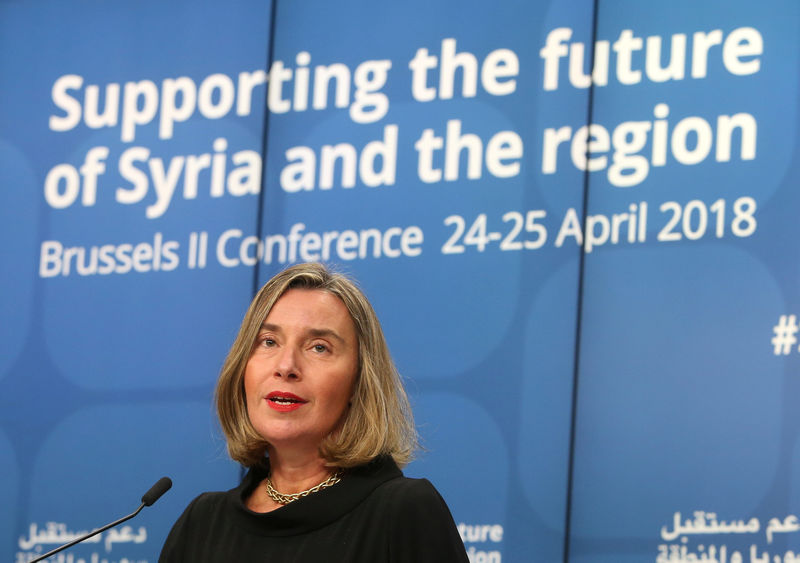 © Reuters. European Union foreign policy chief Mogherini speaks during an international conference on the future of Syria and the region in Brussels
© Reuters. European Union foreign policy chief Mogherini speaks during an international conference on the future of Syria and the region in BrusselsBy Robin Emmott
BRUSSELS (Reuters) – The European Union’s foreign policy chief will on Wednesday propose a 30 percent rise in its foreign aid budget for 2021-2027, according to a document seen by Reuters, as the bloc seeks to increase its influence while the United States pulls back.
From Mexico to Myanmar, the economically powerful bloc’s foreign aid and development budget is a large part of the “soft power” which supports its international diplomacy, especially as it lacks a unified military.
But the EU, the world’s biggest aid donor, holds its money for grants and loans through a host of different funds, known as “external action financing instruments”, often making its response to global crises slow and confused.
As the European Commission sets out its common budget proposal on Wednesday, EU foreign policy chief Federica Mogherini will also propose a single fund responsible for managing most of the 123 billion euros ($148 billion) planned for the 2021-2027 period, an internal document shows.
The increase compares to 95 billion euros for the 2014-2020 external financing budget, split between 19 EU “instruments”, each with separate geographical and administrative procedures.
A few separate EU funds would still remain, for instance for funding Syrian refugees in Turkey.
Seeking to support Ukraine after its 2014 pro-EU uprising, stem a migrant crisis in Syria and deal with failing states on its borders, the European Union is also seeking to reduce its reliance on the United States.
The United States spends about $50 billion a year in foreign aid, but that includes running diplomatic missions and giving academic grants. U.S. President Donald Trump has withheld aid in the Middle East and at a recent Syria donor conference, questioning its value and calling on others to pay.
CRISIS RESERVE
The EU’s proposed single “Neighborhood and International Cooperation Instrument” would have a 10.5-billion-euro reserve for the first time to respond to new crises around the world, rather than the current system of negotiating a reallocation of funds from other parts of the budget.
“A substantial reserve of 10.5 billion euros is a key element of the reform,” the EU document said.
“We have seen in the current long-term budget that we need significant reserve funds to become more responsive and flexible in case of unforeseen circumstances in a constantly evolving global environment,” it said.
The proposal must still be approved by EU lawmakers and EU governments as part of arduous common budget negotiations.
The EU has been criticized for a lack of strategy in its global development role as France pushes for money for its former colonies in Africa, Spain in Latin America and Britain for the Commonwealth. But the EU money is separate from spending by individual governments.
Finding extra money and slimming the EU funds into a single instrument will not be easy, in part because Britain is set to leave the bloc next year and cuts out a large contributor.
Politicians and aid groups are expected to resist the change, fearing a loss of money for their causes, officials say.
Fusion Media or anyone involved with Fusion Media will not accept any liability for loss or damage as a result of reliance on the information including data, quotes, charts and buy/sell signals contained within this website. Please be fully informed regarding the risks and costs associated with trading the financial markets, it is one of the riskiest investment forms possible.
Source: Investing.com



























